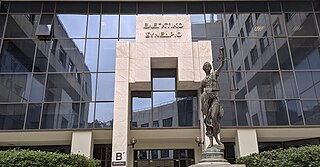
An archive is an accumulation of historical records or materials, in any medium, or the physical facility in which they are located.

The Constitution of the Republic of Lithuania defines the legal foundation for all laws passed in the Republic of Lithuania. The first constitution of the contemporary republic was enacted on 1 August 1922. The current constitution was adopted in a referendum on 25 October 1992.
Records management, also known as records and information management, is an organizational function devoted to the management of information in an organization throughout its life cycle, from the time of creation or receipt to its eventual disposition. This includes identifying, classifying, storing, securing, retrieving, tracking and destroying or permanently preserving records. The ISO 15489-1: 2001 standard defines records management as "[the] field of management responsible for the efficient and systematic control of the creation, receipt, maintenance, use and disposition of records, including the processes for capturing and maintaining evidence of and information about business activities and transactions in the form of records".

In Greece, the Hellenic Court of Audit is the supreme audit institution of the Hellenic Republic, auditing the use of public funds in Greece according to the principles of legality, regularity and sound financial management. Synedrio is also the Supreme Financial Court, one of the three Supreme Courts of Justice, grounded on the Constitution, provides for its jurisdictional, advisory and auditing competences.
The National Registry of Identification and Civil Status is an autonomous constitutional body of the State of Peru. Its role is to maintain the records of births, marriages, divorces and deaths in the country, as well as of the suffrage eligibility and registration. Its headquarters are in downtown Lima.

Lesbian, gay, bisexual, and transgender (LGBT) rights in Lithuania have evolved rapidly over the years, although LGBT people still face some legal challenges not experienced by non-LGBT residents. Both male and female expressions of same-sex sexual activity are legal in Lithuania, but neither civil same-sex partnership nor same-sex marriages are available, meaning that there is no legal recognition of same-sex couples - Lithuania is the only Baltic country to not recognize any same-sex unions.

The State Border Guard Service or VSAT is a border control institution under the Ministry of the Interior of Lithuania charged with controlling and maintaining the security of the Lithuanian borders on land, in the Baltic Sea and the Curonian Lagoon. VSAT is a member of the EU Frontex and is responsible for the security of about 1,070 kilometres (660 mi) of the external border of the European Union with Kaliningrad Oblast and Belarus.

The Constitution of Kosovo is the supreme law of the Republic of Kosovo, a territory of unresolved political status. Article four of the constitution establishes the rules and separate powers of the three branches of the government. The unicameral Assembly of the Republic exercises the legislative power, the executive branch led by the President and the Prime Minister which are responsible for implementing laws and the judicial system headed by the Supreme Court.

The Government of Lithuania, officially the Government of the Republic of Lithuania (GRL), is the cabinet of and exercising executive power in Lithuania. Among other responsibilities, it executes laws and resolutions of the parliament, the Seimas, and the decrees of the President, manages state property and, together with the president, executes the foreign policy of the country. The Government also has the right of legislative initiative, puts together the state budget and presents it to the Seimas for approval.

Latvian State Language Centre is a direct administration institution subordinated to the Minister of Justice of the Republic of Latvia. The purpose of the State Language Centre is to implement the national policy on the use of the official language - Latvian.

The National Defence Volunteer Forces or NDVF is a branch of the Lithuanian Armed Forces. Volunteer forces were officially established on 17 January 1991 by the law of the Supreme Council of Lithuania on the National Defence Volunteer Service providing basis for establishing Voluntary National Defence Service. This decision made legal already existing volunteer formations that began appearing as early as 1990. Voluntary National Defence Service was reorganised into the National Defence Volunteer Force. In 2003 Volunteer Force was integrated into the Lithuanian Land Force. Tasks of volunteer soldiers were inevitably altered when Lithuania became a full-fledged member of NATO: approach of territorial defence was changed into territorial defence and training of modern active reserve. There are around 5000 volunteers and around 800 professional soldiers in the force.

The Ministry of Finance is one of the fourteen ministries of the Government of Moldova. It is the central specialized body of public administration, which develops and promotes the unique policy of training and managing public finances, applying financial levers in line with the requirements of the market economy. In its activity, the Ministry of Finance is governed by the Constitution of the Republic of Moldova, the laws of the Republic, the decrees of the President of the Republic of Moldova, the resolutions of the Parliament, the ordinances, the decisions and the provisions of the Cabinet of Moldova.

The Ministry of Justice of Azerbaijan is a governmental agency within the Cabinet of Azerbaijan in charge of regulation of the justice system, overseeing the public prosecutor, maintaining the legal system and public order and instituting law reforms.

The Vilnius University Faculty of Communication is one of the faculties of Vilnius University. It provides education and training for communication and information specialists and organizes research in these scientific domains. Renata Matkevičienė became the dean of faculty in 2022.

The Lithuanian Military Police is a law enforcement agency operating within the national defence system of the Republic of Lithuania and is a part of the Lithuanian Armed Forces. Military Police are directly subordinate to the Chief of Defence of the Republic of Lithuania. Main tasks of Military Police include preventing of crimes and other breaches of legal acts, investigating and disclosing offences, enforcing law and order in military territories and in the armed forces and ensuring the security of military traffic.

The Latvian Environment, Geology and Meteorology Centre is a governmental service under the Ministry of Environmental Protection and Regional Development of Latvia.

The Ministry of Justice of the Republic of Uzbekistan is the central government body responsible for ensuring the consistent implementation of a unified state policy in the areas of lawmaking and law enforcement in Uzbekistan.
The Diplomatic Service of the Republic of Lithuania is the part of the governmental service tasked with enforcing the foreign policy set by the President, the Parliament, and the Government of the Republic of Lithuania. The head of the service is the Foreign Minister.
Archives in Lithuania began to take shape with the formation of the State of Lithuania, i.e. in the first half of the 13th century, but no documents relating to this period remain. The oldest extant archives is the collection of legal documents of the Office (Chancellery) of the Grand Duke of Lithuania, also known as Lithuanian Metrica: it has documents from the 14th to 18th centuries. In 1795, this collection was transferred from Vilnius to Russia as a war trophy, and now it is preserved in Moscow. The archives which existed in Vilnius and other towns of Lithuania up to the middle of the 19th century were basically institutional archives.

The State Tax Inspectorate or VMI is the tax authority in the Republic of Lithuania. It is an agency under the Ministry of Finance.


















